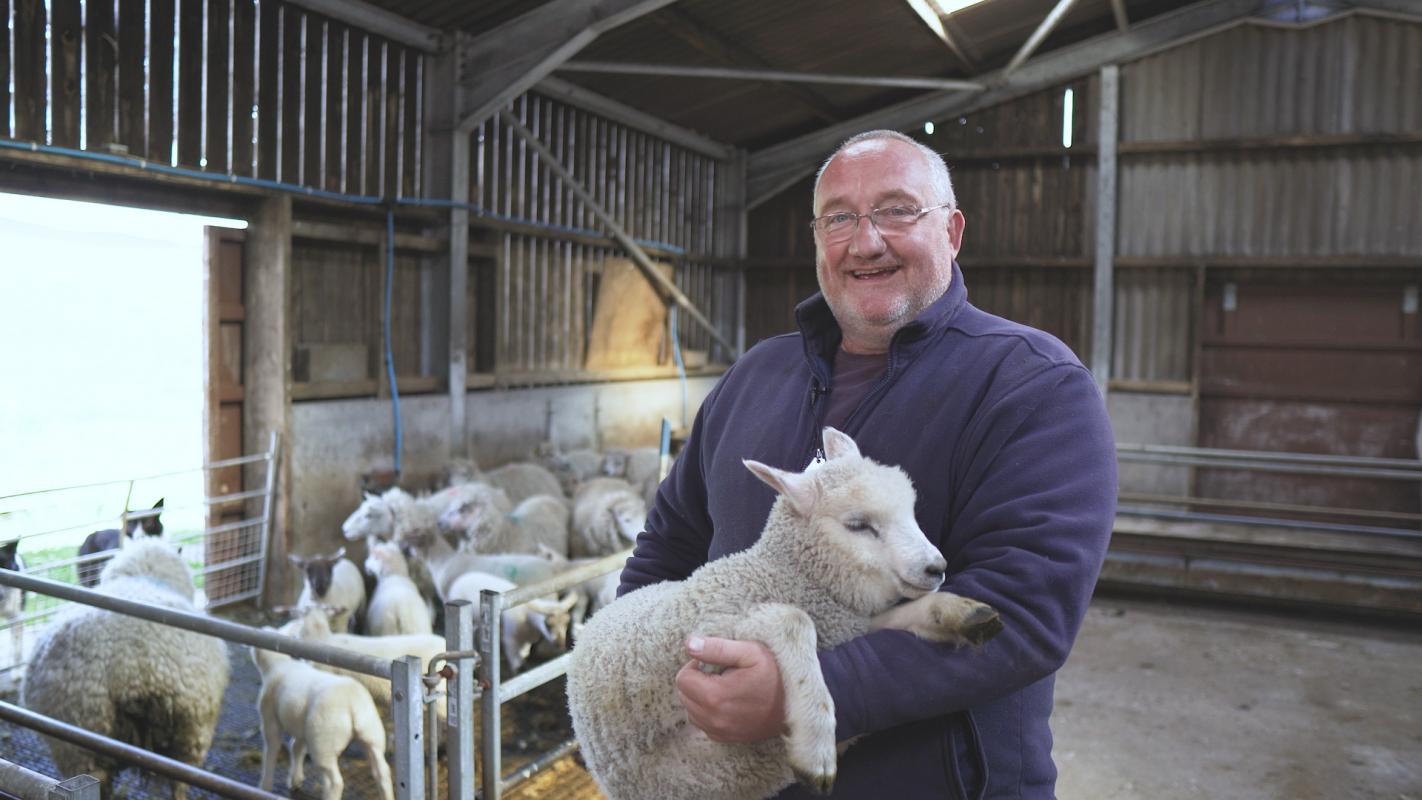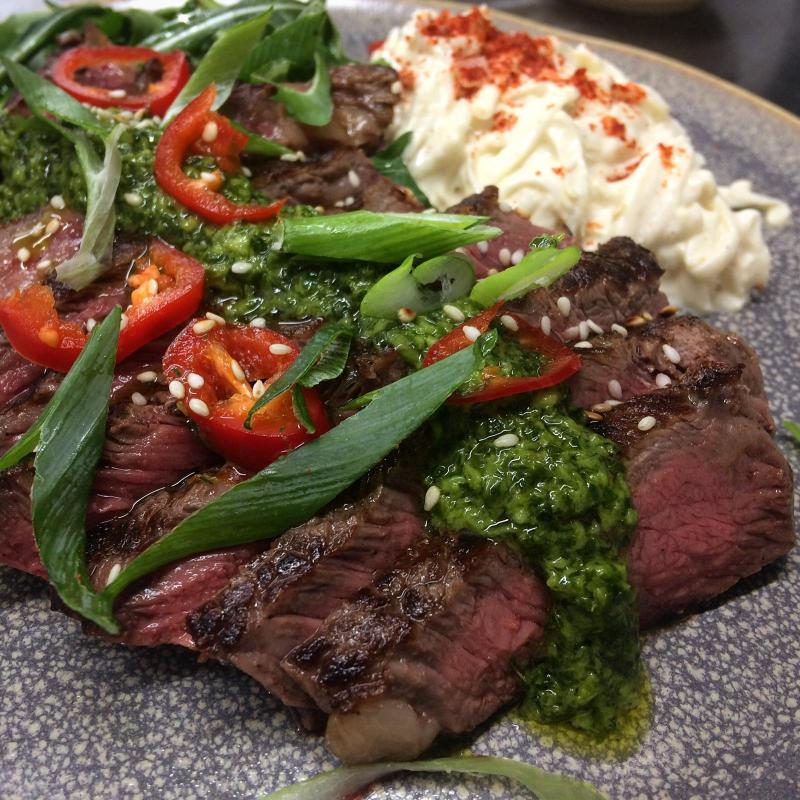After briefly moving south “when I was young, stupid and immature”, he returned home to work at Knowles – delivering fresh fruit to many of the same people he knew from his Marts days.Then came work at the old Shell pipe yard just a stone’s throw from the house we are sitting in on a bright July morning, our two-hour conversation ranging from China’s place in geopolitics to the finer points of how best to coach Shetland’s next generation of footballers.
That oil money came in handy for Eric and his wife Jacqui, whose three children include Sean, 23, who now works with him on the farm. Never short of an opinion, but a very good listener for all that, he teases his cheery better half as she buzzes in and out – at one stage gleefully greeting the delivery of mid-morning bacon-and-egg rolls.
And food is, of course, the primary thing we are here to discuss. Eric’s input and observations are vital to Shetland Food & Drink because they are the formed product of years spent speaking to islanders in many walks of life.
Before taking on the farm in 1994 he spent around a decade running Sportswise with Neil Wilkins and Kevin Denver, before eventually passing his share on to Dennis Leask (now co-director of Fjara).
The 80s and 90s were something of a golden age for retailers in Shetland, awash with oil money, but even before Covid-19 rocked everyone’s world this spring he had identified that the “easy times are over”.
Eric feels it is up to the Shetland community to be “slightly less reactionary and a bit more visionary, to create a proper understanding of where we want to try and be in 20 years’ time”.
He views SFAD as pivotal to realising that ambition. Asked why he became involved, he simply smirks “Marian Armitage”. It is a “hugely rewarding” committee to be part of, he continues, paying tribute to manager Claire White’s “thought-provoking mind” while imploring her to “stop giving me homework!”
“I was absolutely delighted when SFAD was created, and thought this was a real opportunity for it to be showcased in a better and more organised fashion.
“Eateries in Shetland have probably been a bit of a let-down over the last 20-30 years in that there’s been food on the plate, but it’s been a wee bit mass market and not really full of local produce.”
He references certain hotels “even bringing their fish up from Aberdeen, which was an amazing concept” in an archipelago swamped by genuinely world-beating fresh seafood.
Eric detects a “far greater awareness” of local food but “we’re only scratching the surface”. In terms of higher-end eateries, he notes that by last year Scalloway Hotel, The Dowry and The String had collectively raised the bar - but now only the middle of that trio remains and it’s a question of “who’s going to step up” next.
On a six-week visit to New Zealand to follow the British Lions’ rugby tour with friends a few years ago, “I never had one bad meal” and he was struck by the “pride in what they produced as a nation”.
Shetland’s historical connection to the land of the Kiwis doesn’t need rehearsing, but if our cousins in an even more geographically isolated peerie landmass can do it, why can’t we?
“Whenever I go abroad I enjoy eating the local food – some of it you like, some of it you love, some of it you think ‘good luck with that’ – here it’s often quite a Scottish menu, not really a Shetland menu as such.
“I’d love to see a wee bit more of that, especially during the tourist trade in the summertime. It’s not even high end, I wouldn’t always be looking at the most expensive food, but even the more basic food – mince ‘n’ tatties is a splendid meal, but it has to be made with decent mince.
“And getting more polytunnels growing more fresh fruit and vegetables would make a hell of a difference to the hotel trade. It’s not about putting the price up, just about having fresh produce the same as your fresh fish.”
It is creatures of the land Eric himself specialises in. Gremista Farm’s 1,100 acres are supplemented by a further 110 acres at the Ness of Sound and a further 800 acres in hills and common grazings that he rents. Roughly 950 ewes and 35 breeding cows occupy the bulk of the Grahams’ farming time.
“It’s the type of ground we have. My son would like to have more cattle, but we are suited mostly to sheep production. It’s not so much the winter, but if you get a wet summer we don’t have places that can cope with a lot of cattle.”
Nearly half of the lambs go to wholesaler J.W. Gray’s over the course of a year, while Scalloway Meat Company takes most of the Gremista beef (though it also appears, in shredded form, on The Dowry’s current menu). He also supplies lamb to popular local curry houses Saffron and The Gurkha Kitchen.
When it comes to selling his wares, Eric strongly advocates being "honest with folk" and listening to constructive criticism. One woman complained about a lamb he sold her at the turn of the century, but rather than be perturbed he gave her a £50 carcass free of charge – she has now been a customer for 17 years and counting.
“It’s the reaction that you get from people that’s encouraged me to do more. It’s having the right product. It’s maybe not the stuff that wins prizes at showfields, but it eats helluva well."
Anyone who cares passionately about how local economies function would be concerned by the impact of supermarkets. Until 2008 Shetland was one of the last remaining UK postcodes without a Tesco, and a few years later it was purportedly pocketing 60 per cent of the isles’ entire retail spend.
Eric laments the loss of small independent shops that would otherwise still be in business. While welcoming the expansion of Scoop Wholefoods and the new addition of the Island Larder, he feels “a couple of big independents” selling local produce – perhaps a scaled-up version of the booming Sound Service Station – would really help.
Listening to Eric is akin to an audience with an unusually well-researched taxi driver. His rants are measured, and have an endearingly nagging habit of being supported by the evidence.
As a boy of 10 his parents’ food spend equated to around 30-35 per cent of their income – in 2018 the Office for National Statistics estimated the average proportion was little over 10 per cent.
In this much, at least, the product of a King Harald Street upbringing sings in tune with the metropolitan radical intellectuals of the New Economics Foundation: “As an island we’re still quite wealthy, our wage structure is quite good. People are happy to spend an extra £50 on a pair of trainers, but ‘we’ll save £10 by going to Tesco’. I’d rather spend a tenner more in a local grocer’s.
“Food has become cheaper and less important – we’ll buy it and it’ll not matter if we throw it away. With coronavirus, there’s a blip, everybody panicked and headed for food.
"You shouldn’t be bringing food in from the other side of the world – we can grow it perfectly well in Shetland now with polycrubs. With the way the world is going and concerns about climate change, I would have thought having local food utilised in Shetland would make a helluva difference to even the wee footprint that we leave."
Main image by Stephen Mercer.


